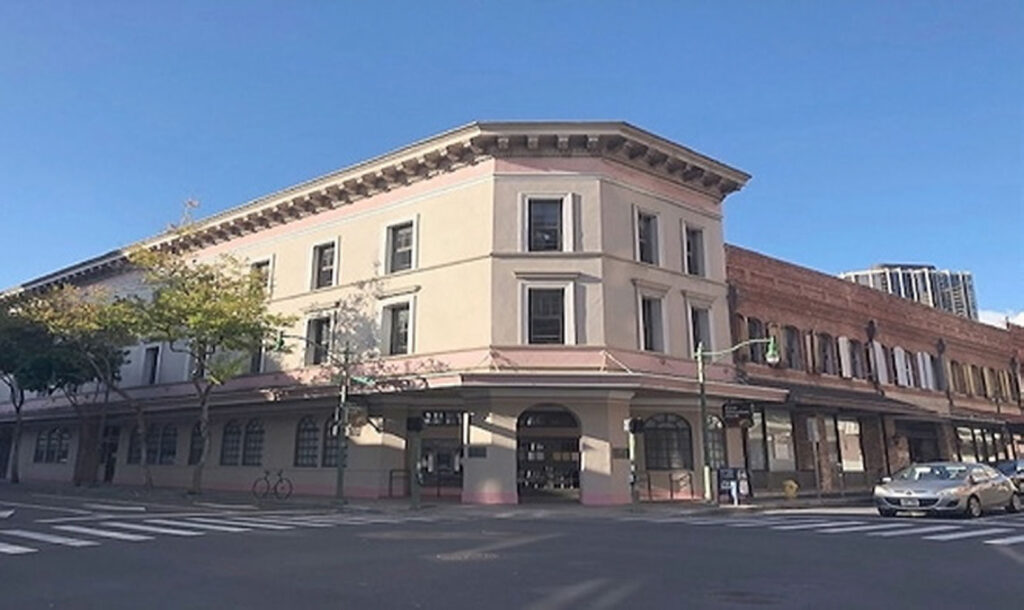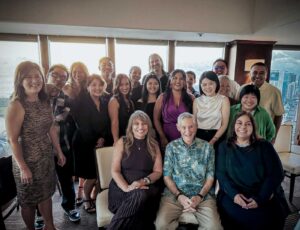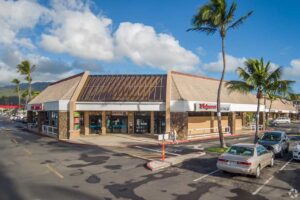A private developer is proposing to convert the historic three-story Hocking Building on the corner of North King Street and Nuuanu Avenue into affordable rental apartments.
A century-old commercial building in Chinatown that began life as a boardinghouse is slated to return to its residential roots under a private developer’s plan backed by state financing.
A development firm led in part by state Rep. Mark Hashem is pursuing the $27 million project that would convert the three-story Hocking Building on a corner of North King Street and Nuuanu Avenue into 40 apartments with monthly rent as low as $634 reserved for households with low incomes.
The project recently received a financing commitment from the Hawaii Housing Finance and Development Corp., a state agency that helps produce affordable housing.
HHFDC’s board voted unanimously July 8 to provide the project’s developer with a $12.4 million loan and $8.4 million in state and federal tax credits. About $3 million in federal tax credits available for preservation of historic properties also is part of the financing mix.
If plans proceed as anticipated, renovation work to covert the building into affordable residential apartments would be completed by the end of next year.
“We are really early in the process,” Hashem said in an email.
Other primary principals of the development team doing business as Hocking Building LP are Kevin Unemori and California- based developers David and Joseph Michael, whose Hawaii affordable-housing projects include Halawa View Apartments, Hale Makana o Maili and Kewalo Apartments.
The Chinatown building is named after Alfred Hocking, a prominent Hawaii businessman and government official around the end of the 19th century who Hashem said developed the building around 1920 as a long-term-stay hotel catering to traveling businessmen.
Hocking, an Englishman who emigrated to the mainland as a young man, moved to Maui in the late 1800s where he started a lumber mill and then the short-lived Nahiku Sugar Co. plantation. He also served as a senator for the Republic of Hawaii representing Maui before moving to Oahu.
In Honolulu, Hocking became chairman of the Oahu Board of Supervisors and founded the Honolulu Brewing and Malting Co., which was established in a brick building Hocking had built in 1899 on Queen Street in Kakaako. The brewery building, also known as the Royal Brewery, became the original home of Primo Beer and today serves as the state-owned home of the Hawaii Community Development Authority.
Hashem said during the HHFDC board meeting that the Hocking Building was converted to commercial use in 1960 when it became home to American Security Bank and offices. First Hawaiian Bank occupies the ground floor today, and the upper two floors have been vacant for a decade or longer, according to Hashem.
“We’re proposing to convert it back to housing,” he told HHFDC’s board.
Under the plan, the development partnership has an agreement to buy the property from descendants of Hocking, who died in 1936.
Hashem got involved in the project as a commercial real estate agent for Sofos Realty Corp., which was retained by the building’s owners to sell the property with a $6.9 million asking price.
Hashem helped facilitate a purchase agreement and became part of the development team aiming to convert the building into residential use, which is allowed under the city’s BMX-4 zoning for the site. This level of business-mixed use zoning provides the highest land use intensity for commerce, business and housing.
As a condition of state financing, apartment rents would remain affordable for low-income households for 61 years, with units reserved for households earning no more than 50% of the annual median income in Honolulu.
The income limit equates to $42,300 for a single person, $48,350 for a couple and $60,400 for a family of four.
Most apartments planned for the building are studios expected to initially rent for $1,057 a month. A dozen one-and two-bedroom units also are planned with rents between $1,133 and $1,360 a month.
Four units in the project would be reserved for households earning no more than 30% of the median income and rent for $634 to $816 a month for studios to two-bedroom units.
Amenities planned for the building include a playground, picnic area, community meeting room, gym, laundry room and shared computer with high-speed internet access.
Four units in the project would be reserved for households earning no more than 30% of the median income and rent for $634 to $816 a month for studios to two-bedroom units.
Amenities planned for the building include a playground, picnic area, community meeting room, gym, laundry room and shared computer with high-speed internet access.





